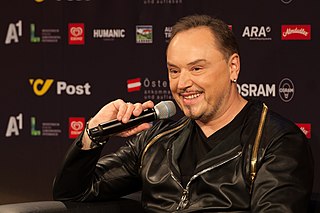Slavko (Cyrillic : Славко) is a Slavic masculine given name. Notable holders of the name include:
Goran is a Slavic male first name, mostly used in south Slavic countries such as Croatia, Serbia, North Macedonia, Montenegro and Bosnia and Herzegovina.
Bojan is a Slavic given name, derived from the Slavic noun boj "battle." The ending -an is a suffix frequently found in anthroponyms of Slavic origin. The feminine variant is Bojana. The name is recorded in historical sources among Serbs, Bulgarians, Czechs, Poles, Croats, Slovenians, Macedonians, Ukrainians and Russians. In Slovenia, it is the 18th most popular name for males, as of 2010.
Zoran is a common South Slavic name, the masculine form of Zora, which means dawn, daybreak. The name is especially common in Serbia, North Macedonia, Croatia and to some degree in Slovenia.
Popović or Popovytch or Popovich or Popovitch is a common Belarusian, Bosnian, Croatian, Montenegrin, Romanian, Russian, Serbian and Ukrainian surname, and sometimes a patronymic meaning son of a priest.

Nikola is a given name which, like Nicholas, is a version of the Greek Nikolaos (Νικόλαος) and it means "the winner of the people". It is common as a masculine given name in the South Slavic countries, while in West Slavic countries it is primarily found as a feminine given name. There is a wide variety of male diminutives of the name, examples including: Niko, Nikolica, Nidžo, Nikolče, Nikša, Nikica, Nikulitsa, Nino, Kole, Kolyo, Kolyu.

Nenad is a male personal name of Slavic origin common in countries that speak Slavic languages. It is more widespread in Bosnia and Herzegovina, Slovenia, Croatia, Serbia, and North Macedonia than in other countries. The name is derived from the word nenadan, which means "unexpected". It was introduced to North Macedonia via Serbian and is now a fairly popular name.
Perović — transliterated as Perovic or Perovich, meaning "son of Pero" — is a Montenegrin, Serbian and Croatian surname. Notable people with the surname include:
Mandić is a Serbo-Croatian surname, a matronymic of the feminine given name Manda, a hypocorism of Mandalena, a variant of Magdalena imported from Italian.
Damjanović is a Serbian and Croatian surname. It may refer to:
Mirko is a masculine given name of South Slavic origin.
Branko is a South Slavic male given name found in all of the former Yugoslavia. It is related to the names Branimir and Branislav, and the female equivalent is Branka.
Božidar is a Slavic given name meaning "Divine gift". The name is a calque of the Greek name Theodoros. Direct cognates of the latter and of Božidar in the (South) Slavic languages include: Teodor, Todor, Tudor, Todo. The feminine form of the name is Božidarka. People with the name Božidar include:
Dragan is a popular South Slavic masculine given name derived from the common Slavic element drag meaning "dear, beloved". The feminine form is Dragana.
Drago is a Bulgarian, Serbian, Slovene, Croatian male given name, usually short for the other names with the root drag-, such as Dragan, Dragutin, etc. The feminine version is Draga. A Romanian version is Dragoș.
Marko is a masculine given name, a cognate of Mark. The male name Marko is a Roman personal name that comes from the Latin word "Marti-co-s" which is a derivative of Mars, the Roman god of war.
Ilija is a South Slavic male given name, cognate of Ilya/Elijah.
Darko is a common South Slavic masculine given name. It is derived from the Slavic root dar 'gift'. Its oldest mention is from the 14th century, included in the Dečani chrysobulls (1330).
Matija is a South Slavic masculine name, a variant of Matthew. Notable people with the name include:
Vlado is a Slavic masculine given name. Notable people with the given name include:

Janko is a name that derives from a diminutive form of the name Jan, Janez (Slovenian), János (Hungarian), and Yakov/Jacob. It also derives from the vernacular form of Latin Johannes. Notable people with the name include: